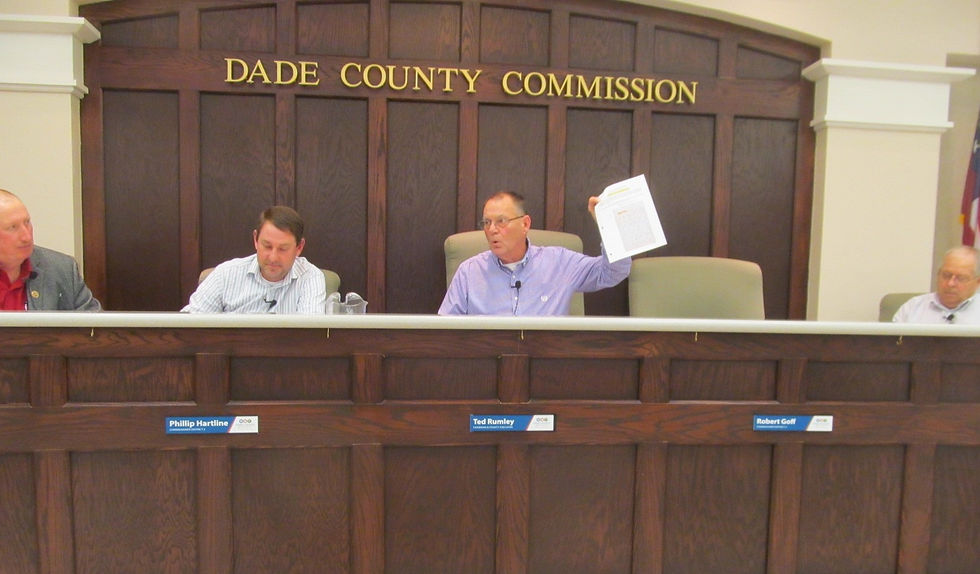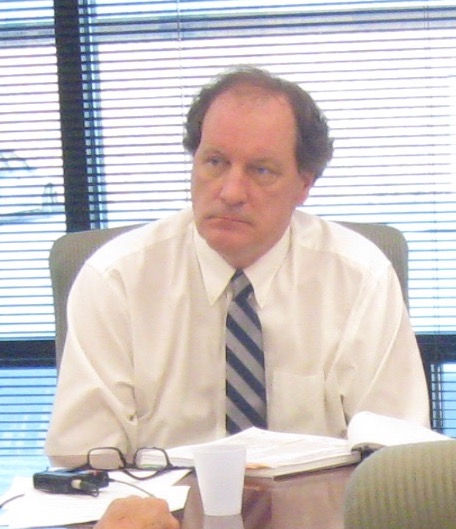County Coughs Up (Finally!) For 4-H Van: Not A Lot Else Shakin'
- Robin Ford Wallace
- Mar 11, 2020
- 6 min read

District 3 Commissioner Robert Goff (center, gesturing) led the Dade County Commission's March 5 meeting in the absence of Chairman Ted Rumley.
The Dade County Commission’s March meeting last week was well attended by residents anxious to see the county’s new heavy industry ordinance become official law, but most appeared to be struggling to stay awake. The passage of Dade’s first stab at zoning might be one for the history books, but not the kind of history books that make for lively reading--the required second reading that took place at the March 5 meeting was a formality and there was little else on the meeting’s agenda.
In point of fact, the heavy industry ordinance had never actually been read aloud even for the first “reading,” much less the second. Such was not the case with a resolution the commission passed last Thursday. District 1 Commissioner Lamar Lowery, who had asked last month that the commission pass a resolution declaring Dade a “Second Amendment sanctuary county,” this month asked that the finished product be read in its entirety. The pages of whereases and therefores were intoned not by County Attorney Robin Rogers, whose billable hours they represented, but by District 3 Commissioner Robert Goff, who was presiding at the meeting in the absence of Executive Chairman Ted Rumley—kidney stones, Goff explained during a break.
The resolution began with an aggressive “WHEREAS, all federal acts, laws, orders, rules or regulations regarding firearms, firearms accessories, and ammunition are a violation of the Second Amendment,” and continued at some length about militias, individual rights to bear arms and the refusal of county officials to enforce federal laws regulating weapon ownership.
At its introduction last month, the resolution was explained as a symbolic act “to show Atlanta how we feel.” Sheriff Ray Cross commented to the commissioners at the February meeting that resolution or no resolution, he would never deprive a law-abiding Dade citizen of his firearm. Robert Goff’s comment after reading all those whereases was: “I cannot speak until I rest a minute.”

County Agent Sarah Dyer(right) had something to say, though: She had priced a van for the 4-H program for $37,752 and asked the commissioners to give her the money. She explained that as it stands 4-H camp trips usually entail renting a school bus for two to-trips and two fro-trips, since the bus driver couldn’t reasonably be expected to stay at camp until the kids were ready to come home.
It was good timing on Ms. Dyer’s part. The 4-H van has been on the SPLOST (special purpose local option sales tax) project lists for the past two SPLOSTs, but each time 4-H requested the van it was told it was too low a priority. Now SPLOST is up for renewal on the May 19 primary ballot and some citizens have questioned why they should continue to vote themselves the extra penny in tax when the county projects it is supposed to fund are routinely left, like the 4-H van, unfulfilled. In any case, the commissioners okayed the money without demur, and without a mention of all the nos that preceded this yes, and the 4-Hers are to have their new ride.
Another resolution the commission passed this month will allow county insurance to cover county volunteers such as those on the mountain rescue team. District 4 Commissioner Allan Bradford pointed out the need to give whatever benefits possible to volunteers because the county is losing them every day.

Otherwise, the big issue of the night was a discussion of whether the commission should, as recommended by citizen Susie Talbott last month, move the citizens’ participation part of commission meetings from the end of the official business session to the unofficial workshop that precedes it, or to between the workshop and the business meeting. As it stands, she had said last month, commissioners can introduce a resolution in their workshop and vote on it in their meeting, and citizens don’t have a chance to weigh in until it’s a fait accompli.
Ms. Talbott had also asked the commissioners to display documents such as resolutions and ordinances on the county website some minimum amount of time in advance of meetings to allow citizens time to examine them before they are voted on.
As to suggestion no. 1: Goff said the commissioners had checked into what other counties do and come up with some suggestions. Some require written requests well in advance, which Goff thought excessive. He favored one method whereby citizens are allowed to speak three minutes a pop before the workshop, with a cap of 20 minutes for all speakers. “You have to draw a line somewhere,” said Lowery.
“You can’t say howdy to your neighbor in three minutes,” objected one member of the audience. [The Planet feels his pain. The Planet requires 500 words, and usually a couple of Shakespeare quotes, to say howdy and a minimum of 1000 to announce a public hearing.]
But the commissioners said that in this model, the citizens still have their full five minutes to speak after the business meeting. Anyway, said Goff: “You’ve got the ear of any commissioner up here for 28, 29, 30 or 31 days a month.” Or come by the office, he added, and talk to anybody there.
Ms. Talbott and the other citizens attending seeming amenable to this method, The Planet asked Goff after the meeting whether it would be instituted at the April meeting. No, replied Goff: The commission needed to discuss it some more.
As to suggestion no. 2, posting documents well in advance of a meeting for citizens to inspect, this seemed to present more of a problem. Suppose the commission posted it and one of the commissioners made revisions, asked Goff. “Now we’re called to task because there’s two documents,” he said. “We tread lightly on that one.”
Why not wait and display the finished document, then? asked citizen Jon Talbott. Time constraints, replied Goff: “We can’t publish it until we get it.”

District 2 Commissioner Phillip Hartline suggested that if a resolution can’t be posted seven days ahead of time, it should automatically tabled until the next month. “There could be urgent things that can’t be put off,” Goff argued.
“I’ve been here for 14 months and I’ve not seen anything that couldn’t wait until next month,” said Hartline.
No action was taken on that suggestion, either. “We’ll work on that,” said Goff.

In the face of the flooding, coronavirus and tornado threats Dade seems to be surfing through one after the other lately, public relations clerk Carey Anderson addressed ready.gov, the Homeland Security site. Dade’s Facebook page and website link to it, she said, and you can also find there information on how to get Hyper Reach alerts. Check out the resources your county offers, she advised.
Commissioner Hartline revealed in his report to the public that he had a meeting scheduled this week with state Sen. Jeff Mullis about grant money for Dade’s controversial plan to build a reservoir on Lookout Creek. It was time to decide whether to go forward with that or no, he said. And he said the county would look at fixing County Road 6 on Sand Mountain after it got finished with the long-discussed work on the Lookout Lake Dam, possibly the beginning of this summer.
Commissioner Allan Bradford said the commission has been pleading with the state not to shut down Highway 136 East as planned while it replaces the bridge there. “We are talking to them,” he said. “We have written letters.”

Dade County Public Library manager Marshana Sharp reminded all that this Thursday at 6 p.m. the library will host Kiss the Ground!, an eco-series program about soil replenishment. Please RSVP. (706-657-3857) so the library can have enough snacks, she said.
Read to Lead, the library's popular annual event at which local leaders read to children, is 10 a.m.-1 p.m. on Saturday, March 21, said Ms. Sharp, and the annual child abuse awareness Glow Run is in April but interested parties should sign up now at Runsignup.com.
She also reminded all that the library can furnish free family passes to the Chattanooga Zoo, the Atlanta Zoo and any state park in Georgia.
Reporting for 4-H, Sarah Dyer said the group's BB target challenge would be March 21—the same day as Read to Lead—and that there would be a meeting on April 13 at 6 p.m. for all parents and kids interested in showing livestock. State Agriculture Commissioner Gary Black will speak at the Georgia Cattlemen’s dinner at 7 p.m. on March 17. Unless otherwise specified all 4-H events are in the Ag Building in front of Dade Middle School on Highway 136 West. More information may be obtained at (706) 657-4116. Ms. Dyer also said registration is open for 4-H summer camp, and that she’s always in the market for donors wishing to sponsor a kid who can’t afford to go otherwise.

County Attorney Robin Rogers had something to say for once when asked about legal doings in Dade this month: The county had had to take action to have a gate improperly placed on county property removed, he said. But he didn’t have much to say: The action was pending so that it would be improper for him to comment on it, he concluded.
The Dade County Commission meets at 6 p.m. on the first Thursday of each month in the county Administrative Building.




Comments